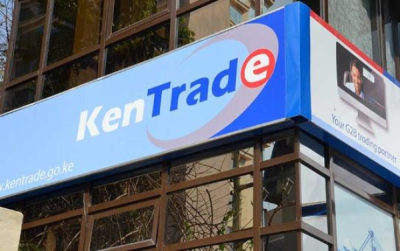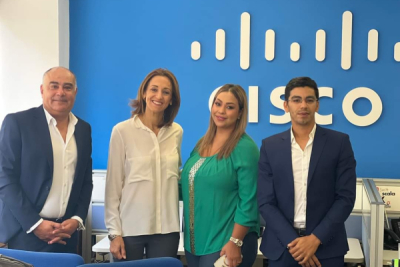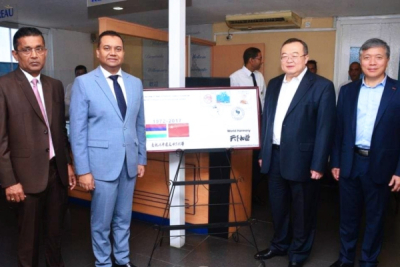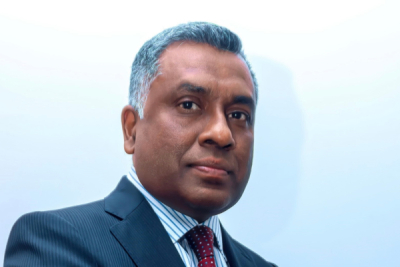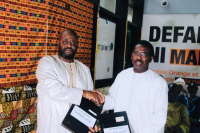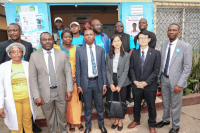
Tech (808)
The digital revolution emerges as a potent catalyst for development and progress worldwide. Nevertheless, it also unveils vulnerabilities that may present obstacles to advancement.
Last week, the cybercriminal group Snatch claimed a cyberattack on the South African Department of Defence (DoD). The group was said to have acquired 1.6 terabytes of sensitive data including military contracts, internal call signs, and personal data including President Cyril Ramaphosa's contact number.
The declaration was qualified as "fake news" by South African National Defence Force (SANDF) spokesperson Brigadier General Andries Mahapa, on Friday 25 August. It has however raised concerns about national security and the country's digital infrastructure.
While the presidency hasn't commented on the matter, some cybersecurity experts have stressed again the need to strengthen cybersecurity protocols to protect the digital transformation of the country. This breach highlights the growing threat of cyberattacks on critical government institutions, emphasizing the importance of robust cybersecurity practices.
In its "Global Cybersecurity Outlook 2022" report, the World Economic Forum (WEF) estimates that Ransomware attacks will be the main threat to the digital systems of organizations and administrations.
The report also points out that "Ransomware attacks saw a significant increase in the first six months of 2021, with global attack volume increasing by 151%. The United States Federal Bureau of Investigation (FBI) has warned that there are now 100 different strains of ransomware in circulation globally. It is unlikely that this issue will diminish in pace or severity any time soon."
Hikmatu Bilali
In recent years, Egypt has made major strides in its digital transformation. To further achieve these goals, the government is searching for partners with shared digital ambitions.
Egypt's Minister of Communications and Information Technology (MCIT), Amr Talaat (photo, right), recently met his counterparts, Abdullah Al-Swaha from Saudi Arabia and Shri Ashwini Vaishnaw (photo, left) from India, to explore ways of strengthening their cooperation in the field of Information and Communication Technology.
The meetings were held on the sidelines of the G20 Ministerial Meeting on the Digital Economy, which took place on Saturday, August 19 in Bangalore, India.
According to the Saudi Press Agency (SPA), discussions between Abdullah Al-Swaha and Amr Talaat focused on strategic projects to promote youth, women, and entrepreneurship. Emphasis was placed on the importance of strengthening bilateral cooperation in critical areas such as communications infrastructure and subsea cables.
The meeting with India's Minister of Railways, Communications, Electronics, and Information Technology, Shri Ashwini Vaishnaw, focused on ways to implement the digital MoU they signed in January. They also discussed means of cooperation in the electronics industry, digital capacity building through partnerships between training institutions affiliated with the two ministries, and possible collaboration in digital infrastructure to support digital transformation.
Also in India, Amr Talaat held talks with Omar Al-Olama, UAE Minister of State for Artificial Intelligence, Digital Economy, and Telework Applications. The two ministers agreed to strengthen cooperation between the two countries in the fields of artificial intelligence and data governance.
The meetings, initiated several months ago by the Egyptian ICT Minister, are part of Egypt's Vision 2030 and its digital transformation strategy, which aim to strengthen economic and social development in all sectors and make the country a digital pole of excellence in Africa.
Samira Njoya
Kenya’s ambition is to become a digital hub in sub-Saharan Africa. To achieve that ambition, the government and its partners are implementing innovative projects to expand the country’s digital economy.
AI tech solutions provider Webb Fontaine recently partnered with state agency Kenya Trade Network Agency (KenTrade) to introduce the Digital Logistics Market Place (DLMP) in Kenya. This platform aims to reshape logistics practices, increase trade volumes, accelerate e-commerce growth, and stimulate the development of Kenya's vast trading market.
"The DLMP is an online marketplace of trade.[...] It offers B2B services to traders with seamless search, find, and send capabilities, fostering growth, reliability, and empowerment," said Webb Fontaine CEO Alioune Ciss.
The introduction of DLMP in Kenya comes as the East African country aims to position itself as a digital hub in sub-Saharan Africa. It is part of KenTrade's strategy to digitize business activities in the country, to increase the contribution of digital trade to the country's economy.
The DLMP brings together shipping lines, trucking companies, freight forwarders, importers, exporters, warehousing companies, and insurance providers in an integrated digital marketplace. This platform gives traders the opportunity to present their services online and compete for bids, fostering a competitive environment that stimulates efficiency and cost savings.
Through this partnership and the establishment of the DLMP, the two entities hope to capitalize on Kenya's strategic location, solid infrastructure, and diversified economy. The aim is to make the DLMP the cornerstone for the continued development of Kenya's booming commercial market.
Samira Njoya
Africa must match its youth education to the needs of the future digital world. According to the World Bank, this shift is crucial and it will help integrate millions of people into the workforce. In several countries, there is a push toward the development of more web, digital, and computer science-focused curricula.
Ynov Campus, a Moroccan computer engineering school, has partnered with Cisco, the US tech giant. Under the agreement they both recently signed, Cisco will help bolster digital skills in Morocco.
The partnership, according to Ynov Campus’s CEO, Amine Zniber (photo, left), will offer the school’s students many opportunities.
"As one of the world's leading information and communication technology companies, Cisco plays a crucial role in digital and technological transformation on a global scale. Thanks to this partnership, Ynov Campus students will now have access to world-class training resources, internationally recognized certifications, and internship and job opportunities within Cisco's global network," Zniber told a local media outlet.
The signing reinforces the partners’ commitment to education, innovation, and youth employability in Morocco. Besides benefits for students, the deal will also provide opportunities for joint research and development as well as collaborations on innovative technological projects.
The goal is to provide young people with the necessary skills to succeed in a constantly evolving digital economy and contribute to Africa’s development. According to the World Bank, the continent will account for a third of the world's young population by 2050.
Samira Njoya
Spurred by Covid and digital transformation, the postal sector has morphed in a very short period, especially looking at e-commerce’s rapid growth. To ride this tide, African countries decided to update their post systems.
China will support the digital transformation of Mauritius’ post company, Mauritius Post. A group of Chinese experts was in the African country earlier this week, July 24th, in this framework.
China, according to the Mauritian Minister of ICT and Innovation, Darsanand Balgobin, will provide in-depth training to post office staff, equipping them with the knowledge and skills they will need to implement, locally, everything they will be taught.
The Asian giant will also provide its technical expertise for the digitization of key postal activities to improve the postal services offered to the population.
The collaboration aligns with Mauritius Post’s new vision, which involves introducing digital technology into its main activities and revitalizing itself through the e-post project.
To this end, the Mauritian government has sought the expertise of several countries to help improve local postal services. The government, among others, wants parcel delivery to be faster and make postal services more efficient, by introducing digital claim services, parcel tracking, and online payments.
Many African countries, like Mauritius, are taking steps to digitize their postal services to boost postal activity, and e-commerce, and attract big sales companies. Examples of such countries include Senegal, Congo, South Africa, and Djibouti.
Samira Njoya
In 1994, Eastern and Southern African countries formed a common market, offering numerous facilities to national actors. However, various non-tariff barriers, financial barriers particularly, threaten the commercial inclusion sought.
The Common Market for Eastern and Southern Africa (COMESA) will launch a digital payment platform by June 2024, COMESA Business Council (CBC) CEO Teddy Soobramanien (photo) announced at a press conference in Lusaka (Zambia) last Monday.
The platform aims to facilitate online transactions and boost trade relations between countries in the region. "The project will be launched in eight countries before being rolled out to all 21 member states by June next year [...] Financial inclusion ecosystems are key to sustainable development and economic progress, particularly among small and medium-sized enterprises (SMEs), which drive innovation, job creation, and poverty reduction," said Teddy Soobramanien.
"By harnessing the power of digital technology, we can unlock the unprecedented opportunities for them, empowering them to realize their full potential and contribute to the region’s prosperity," he added.
The implementation of the digital payment platform is part of a COMESA project aimed at improving the digital financial inclusion of micro, small, and medium-sized enterprises (MSMEs) in the region. The project focuses on improving financial regulation and reducing cross-border transaction costs for MSMEs in the concerned markets.
Once deployed, the platform will not only stimulate economic growth and financially empower the most vulnerable social categories but, it will also promote partnerships between businesses in the region.
Samira Njoya
Dakar’s Cheikh Anta Diop University (UCAD) switched to online learning in mid-June. To strengthen its offering, the university is signing partnerships and multiplying efforts to meet the needs of thousands of students.
Dakar’s Cheikh Anta Diop University (UCAD) and the National Telecommunications Company of Senegal (SONATEL) signed a partnership agreement last Friday, July 14. The move is to launch the "Pass UCAD" program, whose goal is to allow UCAD’s students and teachers to access the university’s dedicated online learning platform for free.
SONATEL’s Managing Director, Sékou Dramé (picture on the right), announced the establishment of a platform that allows students to continue classes online. "From next week, it will be implemented. This platform will allow students to identify themselves and access this specific 'Pass UCAD' issued for students, which will allow them to connect to the online teaching platform set up by the university for free until October 31," he said.
A month ago, the Senegalese government decided to adopt online education in the country's public universities amidst violent protests that broke out after opposition leader Ousmane Sonko was convicted. Many universities’ facilities were destroyed during the protests; these include six UCAD faculties.
The new partnership with SONATEL will support education and promote internet access for UCAD students. It will also allow students to benefit from educational resources and online research, as well as strengthen their digital skills, and prepare them for the digital future.
Samira Njoya
Earlier this year, the Republic of Congo launched a project to speed up its digital transformation. In support of the move, the country’s partners have launched the "Mangwele" application designed to enhance the health information system.
On Wednesday, July 5, Congolese and Japanese authorities launched the "Mangwele" application, an SMS-based vaccination reminder system, at the Tenrikyo Integrated Health Center in Makélékélé.
The new system aims, among other things, to remind parents, particularly mothers, of their children's vaccination appointments according to the schedule of the Expanded Program on Immunization (EPI).
Lancement ce matin au CSI de Tenrikyo de MANGWELE. Grâce à ce projet financé par @JapanGov, votre bébé est enregistré dès la naissance et vous recevez un 📩 de rappel 3 jours avant chaque rdv de💉 #UNICEFTHXJAPAN @MofaJapan_en @ODA_mofa_japan @UNICEFinJapan pic.twitter.com/l7OFaArnn8
— UNICEF Congo Brazza (@UNICEFcongoBZV) July 5, 2023
"Through this project, health personnel will be able to follow the status of birth registrations and track each child's vaccinations by recording this information in a national database. This system will allow for individualized monitoring and ensure that all children receive all the necessary vaccines, even if they move regions," explained Satoko Morito, the First Secretary of the Japanese Embassy in Congo, representing the ambassador.
Mangwele’s launch is part of the UNICEF’s Digital Health System Support Project which fights infectious diseases in Africa. Japan spent $3.3 million on the launch.
The Democratic Republic of Congo and Benin are the two other beneficiary countries of Japan's financing for the implementation of the digital introduction project for the fight against infectious diseases in Africa.
In the long run, the project will help improve vaccination rates across the continent but also make it easier to analyze and use real-time data, thus enabling better estimation of actual vaccination rates, including routine and COVID-19 vaccination.
Samira Njoya
Kenya has introduced its digital sex offender registry as part of ongoing digitization efforts across all sectors, including the justice system. By doing so, the government aims to significantly reduce sexual assaults on women and children and facilitate the identification of perpetrators.
On Monday 26, Martha Koome, the Chief Justice of Kenya, unveiled the country's first digital sex offender registry at the Kibera Law Courts. The registry comprises a comprehensive database containing crucial information about convicted sex offenders.
11. The Register, established under the Sexual Offences Act, serves as a crucial database, holding the records of all convicted offenders. By automating this Register, we will ensure easy access to information on convicted sex offenders, facilitating expedited justice. pic.twitter.com/OW7FArbZvC
— Hon. Justice Martha K. Koome, EGH (@CJMarthaKoome) June 26, 2023
During this ceremony, she stated: "The implementation of the automated registry is a vital tool for protecting the public from sex offenders. By providing accessible information, we empower individuals to take necessary precautions and create an environment that discourages such offenses."
In recent years, Kenya faced an upsurge in sexual offenses. This created so many challenges to the safety and well-being of its citizens. The digital registry will bolster government efforts against this menace.
Before this action, the government took some measures to fight sexual offenses in Kenya. In 2008 for example, Legal Notice No. 133, supplementing the Sexual Offenses Act, mandated the director of the Criminal Investigations Department to establish a DNA database of dangerous sex offenders.
This digital tool will be useful for key stakeholders in Kenya's justice system in tracking and monitoring sex offenders after their release from prison. It will also help the public to access information about sex offenders residing in their neighborhoods. Thus, they can take precautionary measures to protect themselves and their children.
Through this, Kenya joins other countries that have implemented sex offender registries. In 2007, South Africa established a similar registry. Unfortunately, it is kept confidential and not open to the public.
Samira Njoya
Over the past few years, Tanzania has taken steps to orbit its satellite. But, in recent months, it is stepping up initiatives to speed up the process.
Tanzania has set up a special government team to study the country’s needs in preparation for the construction of a national satellite. Its Deputy Minister of Information, Communication, and Technology Kundo Mathew said as much on Monday, June 19 at the opening of the Information Systems Audit and Control Association (ISACA) 2023 Annual Conference, which runs until today, Friday, June 23 in Arusha.
“...We are taking time to identify our needs for the proposed National Satellite. We are mulling the intended use for the Tanzanian Satellite, will it be just for patrolling our skies, or safeguarding our resources from the air; maybe also monitoring the country’s borders digitally?” said Minister Kundo Mathew.
“There are areas dotted with big hills and mountains where it becomes impossible for the fiber optic cables to be laid through, these are where the satellite will take over to spread digital waves,” he added.
Tanzania's announcement comes at a time when African governments are showing increasing interest in space programs and stepping up investment in the sector. According to the 2022 edition of Space In Africa's annual report on the African space industry, the value of the industry is expected to reach $22.64 billion in 2026, up from $19.49 billion in 2021. The same report indicates that African nations allocated a total of $534.9 million to space programs in 2022, compared with $523.2 million in 2021.
The satellite that the Tanzanian government plans to launch will complement the 758 communication towers erected throughout the country and the 600 others to be installed soon.
It could thus be used to improve coverage of telecoms and broadband Internet services, particularly in rural or remote areas that are hardly accessible to mobile operators. These efforts will help reduce the digital divide and improve access to education and health services. According to the latest statistics from the Tanzania Communications Regulatory Authority (TCRA), the country has 61.9 million cell phone subscribers and 33.1 million Internet users.
Samira Njoya
More...
The transaction will allow GoCampus to realize its founder’s unfulfilled business goals.
Indian tech entrepreneur Vickram Sybri recently acquired the Nigerian university networking platform GoCampus for $71,000.
The platform, which connects college students, managed to connect over 370,000 users in three countries in the space of four months, becoming a thriving platform for student interaction.
In the weeks leading to the sale, the platform experienced a shutdown and other problems that prevented it from evolving. Those obstacles forced young Nigerian entrepreneur Muili Seun (photo), founder of Go Campus, to sell his platform.
“It was a tough decision to part ways with GoCampus, but I wanted to ensure its continued success and growth. The platform faced challenges due to infrastructure limitations, resulting in occasional downtime during peak periods. By selling the platform to an established tech guru, I am confident it will receive the necessary support and resources to overcome these obstacles,” he said.
GoCampus has rapidly gained in popularity. The platform has revolutionized the way students interact, enabling them to connect to exchange and share ideas on assignments and other university-related topics.
With this acquisition, Indian entrepreneur Vickram Sybri will be able to continue the work started by Muili Seun. Well-known in the Indian and international technology spheres, his company specializes in digital marketing and building a strong and influential online presence for individuals and companies.
Samira Njoya
Like many other African countries, Somalia has decided to take advantage of technology to solve some of the problems it faces. The country has just adopted a national QR coding technology to improve financial inclusion and the local e-commerce segment by extension.
Somali citizens will soon be able to pay for goods and services in stores and supermarkets by scanning a quick response (QR) code using their mobile devices. On Tuesday, June 20, the Central Bank of Somalia (CBS) launched the standardized national QR code called "SOMQR". It aims to stimulate digital payments, which are offered by the various payment service providers in the country.
“SOMQR Code Standard will revolutionize the payment landscape in Somalia as a low-cost, scalable, secure, and interoperable solution towards a cashless society. [...] we are proud of achieving yet another major milestone in the digitalization process of the payment systems," said CBS governor Abdirahman Mohamed Abdullahi (photo).
The launch of SOMQR is the latest in a series of reforms undertaken by CBS in recent years. It follows the launch, in August 2021, of the National Payment System (NPS), an interbank payment, clearing, and settlement system linking the Central Bank and the 13 licensed commercial banks.
Also as part of its drive to modernize services, last March the CBS began enforcing the use of the International Bank Account Number (IBAN) to connect the country's financial institutions to the rest of the international banking services and facilitate the validation of their transactions.
The SOMQR is the latest addition to all these initiatives. As a fast, scalable, and secure low-cost payment platform, its effective implementation will revolutionize the payments landscape in Somalia. The standardized QR code will enable merchants to receive payments instantly, anytime, anywhere.
Samira Njoya
Cheikh Tidiane Mbaye is Chairman of the International Jury of the Orange Social Venture Prize in Africa and the Middle East (POESAM). For several years, he has reviewed thousands of high-potential projects. He was interviewed by We Are Tech about the impact of Orange's innovation support ecosystem and his perception of the African digital economy.
We recently attended the 13th edition of POESAM. Looking at the projects you've judged over the years, what's your assessment of the level of tech innovation in Africa?
This is indeed the 13th edition. I've been on the jury for about ten years now, and I've been chairing it for about six if I'm not mistaken. And so, when you look at the number of entries, the interest generated by the prize, the evolution of the media impact, you realize that we're growing fast. To give you a figure, the number of candidates for this year's edition (2023) is around 1,400. And it seems to me that four, even five years ago, we were still around half that number. We've almost doubled in less than five years, and I find that very interesting. Another point to note is that the percentage of women is also increasing. At the moment, we're almost at 30% women, which is very significant. I think it's also important to understand that the projects submitted to POESAM reflect African needs in some way. I find it interesting to observe that these projects reflect not only the ability of young entrepreneurs to create, innovate and develop but also reflect African needs. For example, at the last award, the majority of projects focused on education, health, agriculture, and e-commerce, in order of growth. It's very interesting to see the evolution of innovation in these fields, and the Orange Prize rewards above all social impacts.
Personally, why did you agree to chair the international jury?
As I said, I've been a member of the jury for ten years. I was offered the presidency a few years ago, and I accepted. But what counts for me is the fact that I've been a member of the jury for so many years. I think my choice reflects a passion and a conviction. My passion is development. I'm passionate about development and what it takes to get there. My conviction is that we can do it. We can do it because we have the resources to do it. One of the keys for me is the private sector and the role it plays, particularly the role played by small and medium-sized enterprises. The government also has a role to play. Good governance will accelerate all these, despite the weaknesses. That's what I'm passionate about, and I'm ready to take part in any serious initiative that serves this passion and conviction, highlighting projects that have an impact on everyday life.
How did your love of innovation, which feeds your passion for development, come about?
I worked for Orange as a manager, in particular as Managing Director of Sonatel for 25 years. I was also involved in another field, that of telecoms infrastructure, which I believe is essential to the development of tech entrepreneurship. You need a good base, you need good infrastructure. Everything we've done over the years is based on the infrastructures we've taken several years to install. We've seen what our network innovations bring to communities. The innovative services offered by entrepreneurs are channeled through them. Those innovative services are offered by talented young Africans, particularly those who are promoted, supported, and encouraged by this extremely useful prize [POESAM]. So there's a continuity between what I've done since I started working and what I'm doing today.
What has the experience of chairing the POESAM jury brought you?
I have to say that I'm learning a lot, coming from an infrastructure background. We're talking about innovation and startups here. These young entrepreneurs we're supporting today criticize our activities. They criticize the companies I've worked for. This allows me to correct these companies. It allows me to get to the other side and see how things can be improved. I've intervened several times in several Orange countries to facilitate relations between startups and the Orange operators, which we represent. Operators are big, strong and don't always think of everything. These interactions have given me knowledge and humility too. I think digital inclusion in Africa is happening, and it's already not bad, contrary to popular belief.
What is your assessment of the impact POESAM has had over the years on technological innovation in Africa, and economic and social development in particular?
The prize helps a lot of entrepreneurs and startups. I have some pretty good examples. I have in mind the example of Mr. Johnson from Liberia, who is now developing palm oil-based products to offer renewable energy solutions. Thanks to the POESAM grant he received in 2018, he has doubled his income and created 24 additional jobs. Then there's the Tunisian company Kumulus, which has developed a machine that turns air into water. It managed to raise its first million euros, thanks to us, to increase its visibility. It works with Orange Group companies. There are other examples we can cite. These companies have a concrete impact on their customers. It's not just the POESAM prize-winners that this award has helped, it has stimulated innovation by enabling a large number of young Africans to dare [to innovate] and I think that's something very important. Orange Africa and the Middle East covers 17 countries. Every Orange company in every country has contributed to nurturing this innovation and drive.
Given all the innovations you've seen over the last 13 editions, how do you see Africa's prospects in the global digital economy?
I believe that Africa will play a decisive role in the digital economy. I met an entrepreneur who has worked in some of the world's biggest tech companies and has now returned to Africa. He gave up an attractive position in a big company to create his startup in the health sector. Like me, he too - along with several international firms, the World Bank, the IFC, and specialized organizations - believes that the future of Africa's digital economy will be formidable. I think that this entrepreneurial dynamism is well understood by those of us who have an insightful reading.
From June 14 to 17, the 2023 edition of the digital trade fair VivaTech was held in Paris. On the sidelines of the event, the second edition of the AfricaTech Awards was launched.
Waspito, Kubik, and Curacel are the winners of the second edition of the AfricaTech Awards. They were the healthtech, climate tech, and fintech awardees, respectively.
Waspito, the winner in the healthtech category, is a Cameroonian start-up that connects patients and doctors for instant video consultations via its Android and iOS apps. It was founded in 2020 by Jean Lobé Lobé and has attracted investors such as Orange Ventures and Launch Africa Ventures.
Curacel, the winner of the fintech category, is a Nigerian solution that enables companies to distribute insurance policies and process claims faster. Founded in 2019 by Henry Mascot and John Dada, it also has a mobile app accessible on iOS and Android.
Kubik is the winner of the climate tech category. It is a Kenyan startup founded in 2021 by Ndeye Penda Marre. It transforms hard-to-recycle plastic waste into low-carbon building materials.
The AfricaTech Awards was organized in Paris on Thursday, June 15, during the digital trade fair VivaTech, in partnership with the International Finance Corporation (IFC). It was initiated last year to give African startups more visibility among global investors. At its first edition in 2022, Kenya's Weee Centre (climate tech), Egypt's Chefaa (healthtech), and South Africa's Click2sure (fintech) were the crown winners.
Adoni Conrad Quenum




